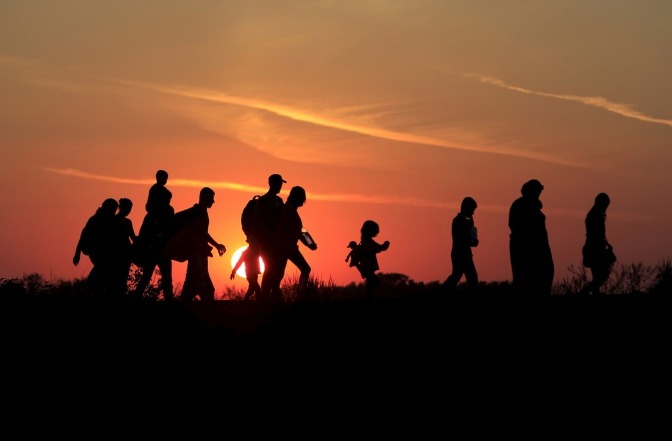As the European Union faced the biggest migration crisis since the end of the WWII, the problems of ‘otherness’ revealed itself in the ‘old new’ light. Jacques Derrida praised the arrival of ‘the Other’ as one of, if not the most important, event(s) in one’s life. The notion of ‘stability’ and human’s inherent desire to live in the constant ‘present’ is the main enemy of a better future. The Illusion of life’s course going on some kind of predictable track helps to mitigate existential anxiety.
Human life so far remains in the core of the values in the Western society. Michel Foucault, the great historian and archaeologist of ‘normality’ and ‘deviations’, nailed it by conceiving the term ‘biopolitics’ to describe the prevailing approach to citizens by the states in postmodernity. The main value of the biopolitical approach in government planning is to create institutions of control over our health and potential hazard to it. In a way, it is something like a network of prisons (hospitals, schools, etc.) to vary our choices about what to do with our life and health: The preservation of life at any cost as the highest goal of the enlightened, secular state of today.
Cameroon-born philosopher and political scientist Achille Mbembe recently proposed a new way to look at the evolution of the biopolitical approach to managing societies, adjusting Foucault’s original writing to contemporaneity of muddy geopolitics, the process of postmodern deconstruction and further inevitable reconstruction of ideologies. He introduced the term ‘necropower’ and ‘necropolitics’ as it’s functional apparatus, claiming among other things that "contemporary forms of subjugation of life to the power of death (necropolitics) profoundly reconfigure the relations among resistance, sacrifice, and terror”.
The motto and guiding principle of Foucaultian biopolitics can be summarised as ‘live and let live’. We all share the same planet with quite limited resources and fragile ecosystem (that we’ve managed to fuck up quite intensively led by ultra-capitalistic greed and selfish ideological dogmatism in the last centuries–but that’s another subject). The goal of each individual, which reflects the goal of society, is to allow equal opportunities for the life to be preserved, to flourish and have the opportunity to pass genes to the next generations. Or as it is often described in obituaries–to be ‘survived’ by someone: children, spouses, etc. As a concept this ‘living and letting someone else live’ went beyond the nuclear family and is currently considered, in an enlightened societies, as a definition of a responsible approach to the coexistence of peoples.
However, the reality of the challenges in contemporary geopolitics present a ‘new normal’, where a ‘live and let die’ approach comes into play. Mbembe’s theoretical constructs suddenly acquire physical shapes: the EU border controls are preventing migrants from Syria, Eritrea, Afghanistan, Iraq, Yemen and other unfortunate places torn by all kinds of wars (often inflicted by the colonialism of those very EU members) from ‘living’ by blocking their access to a possibility to survive. The hair-thin line of division between terms ‘migrant’ and ‘refugee’ became a battlefront that will define the number of those who will get a chance ‘to live’ and those who will be assigned ‘to die’.
While the economists, pundits, leaders of public opinion are ideologically divided on several fronts of actively or moderately defending or opposing the possible implementation of a policy granting asylum to millions of people who try to enter the EU, there is still the underlying issue of the Western world turning back on it’s fundamental principles of the universality of basic values of humanism . Hypocrisy, that find itself masked by state-driven nationalism, is so crippling that it even undermines the very essence of the European Union, which still claims to represent ‘universal’ Western Enlightenment.
The migrant crisis is indeed far from being the only problem that Europe faces. However, it well might (hopefully) be the very ‘alpha’ issue that will define the future of the European project itself. Will it collapse under the pressure of inward-looking, retrograde nationalism, that presumes the citizens of Europe incapable of embracing the challenge of the arrival of ‘the others’? Or will it use the opportunity, which was lost during Greek austerity crisis, to treat this challenge as the much-needed-kick-in-the-ass for the European project?

